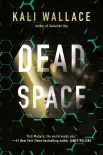Dead Space Kali Wallace (best non fiction books to read txt) 📖

- Author: Kali Wallace
Book online «Dead Space Kali Wallace (best non fiction books to read txt) 📖». Author Kali Wallace
“One of the Black Halo members, yeah?” Adisa said.
“Yes. The one who joined our team. And I thought maybe by bringing up Excelsior and Kristin at the same time, David was trying to tell me he’d discovered something about her or Black Halo that we didn’t know. Like, maybe everybody had missed something about who was responsible for the Symposium attack. Or that he had learned something about somebody here on Nimue, like a crew member who was secretly involved with something dangerous, something the company screening had missed. But I looked for evidence of all that. I didn’t find anything. So maybe that’s not what it was after all.”
I took a breath, looked around the room again. Two cameras, probably only one audio recorder, but all those red lights, piercing the paler glow of Adisa’s flashlight, still looked to me like eyes. The room seemed to expand and contract whenever I turned my head, the shadows wavering, the close walls and crowded terminals blurring. I was too warm. I was tired. I was scared shitless. It was hard to wrangle my thoughts into order.
“I think maybe he was referencing something that happened before we left Earth,” I began. “Right after Kristin joined the project.”
I paused. Adisa and Hunter were listening. I needed a moment to figure out what to say.
It was strange to me, how I remembered it mostly in the aftermath rather than in the event itself. It had been a long, busy week of problems and meetings and emergency calls into the lab late at night, but all of that blurred together in a haze of frustration and exhaustion. Where my memories became clear again was afterward—it must have been Friday. A long, leisurely, decadent summer twilight, the sort of summer evening that only ever happens in the City of Dreaming Spires. Purple in the sky at ten o’clock, the leafy rustle of trees in a gentle breeze. Dry red Spanish wine from Sunita’s cellar. We were drinking in her garden, just her and me, long after dinner was over and the others had left for their own homes. The murmuring sounds of the city were muffled by her lush garden hedge, and the anxieties of the week slipped away as the whole of the world drew itself into the well of summer darkness that surrounded us. I didn’t want to leave. I knew there was more we needed to talk about.
“We need to discuss what your child has done,” Sunita had said, her voice gentle and teasing as a warm breeze. “Have you worked it out?”
“Why is it only my child when it makes trouble?” I had asked, laughing, but we both knew I was laughing to cover my lingering unease.
Vanguard was always surprising us; that was nothing new. It was always learning new methods for solving problems, evolving new ways to face challenges, teaching itself things we had never realized it needed to learn. That was what it was supposed to do, and I never grew tired of that thrilling moment of realization, the heart-skipping second when I understood that it had outgrown and overreached the tasks we had set before it. I was enamored of the way it thought, the way it communicated, the way it grew and changed and made itself ever more complex.
When it taught itself to access the building security system and open the doors as I arrived in the morning, we were surprised but not overly concerned. When it noticed and identified a grad student stealing tools from the machine lab, we were charmed and a bit impressed. It was not supposed to be able to do any of that—it was not supposed to monitor personnel or have any facilities control over its surroundings—but it was an explorer by design, an informational pack-rat by choice, created for observation, collection, and, if necessary, self-preservation. We reasoned that it had learned these behaviors in response to the questions we put before it regarding what it would do if there were vital crew or systems failures at the station on Titan. It would still need a way to go home, even if there was nobody waiting to let it in.
We only began to worry when it started locking doors instead of opening them.
“We didn’t realize it was targeting anybody in particular at first,” I said. I rubbed my hand over my shaved head, wiping sweat from my scalp. “We thought it had found another thief, maybe, or was looking for one. It took some testing to figure out that Kristin was the common denominator. Every time Vanguard took over the building’s security system to lock the doors, it was when she was among the people trying to get in.”
“It knew about her?” Hunter asked.
“I don’t know,” I said. “It must have known something. We had introduced her to Vanguard the same as we did everybody. She had all the right credentials. She passed the background checks easily. But Vanguard kept doing it, even after we left Earth. Changing the access codes so Kristin couldn’t get into the lab, or couldn’t do her work. We thought it was . . . I don’t know, a little funny. We laughed about it.”
It had annoyed the hell out of Kristin, naturally, but it had intrigued me and Sunita that Vanguard was taking actions we could find no logical basis for. Everything else it did had a reason. But this we could not explain. That summer evening in her garden, Sunita had suggested it might be because Vanguard knew I didn’t want a new member of the team, but that wasn’t a real reason, not for an AI. There had to be a decision, an algorithm, a series of choices that translated my displeasure at having to replace a member of the team into Vanguard’s actions. We had built





Comments (0)